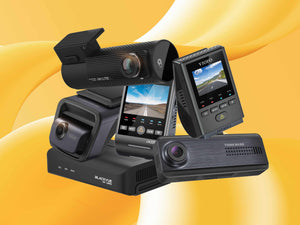The Thinkware F800 and F800 Pro share similar hardware and aside from the obvious difference in the front camera design, customers may not be aware of the more subtle firmware differences. These are important to note as they may have an effect on the overall user experience. In terms of design, the two cameras have the exact same shape and dimensions but the F800 Pro uses an all black design that will typically be more discreet compared to the silver and grey F800. The mounting hardware and wiring will also be exactly the same between both cameras. Video quality will also be the same as they both share the Ambarella A12 processor and Sony STARVIS sensors. You can check out the sample footage from both cameras here: F800 Sample, F800 Pro Sample

128GB Micro SD Support
While both cameras offer memory card partitioning, at the time of this comparison only the F800 Pro officially supports 128GB micro SD cards. We have been able to run aftermarket 128GB cards in the F800 Pro such as the Transcend Premium and Samsung Evo Select. Note that this does not mean the F800 Pro will take any 128GB Micro SD card. If the card is of lower quality it may trigger an error message and won't record properly. Thinkware has yet to release their factory Micro SD card in a 128GB card size yet but we suspect that will be the most reliable card to use with this dash cam. The Thinkware factory cards typically offer SPOR (sudden power off recovery) technology that enhances reliability in emergency situations.
Energy Saving Parking Mode
The F800 Pro has a special parking mode that is designed to extend parking recording by reducing power consumption. Low power consumption has always been a benefit on Thinkware dash cams compared to other 2 channel systems but this takes it one step further. We don't recommend the energy saving parking mode for everyone though, this mode doesn't offer pre-buffered recording or motion detection. It is only triggered by the G-Sensor and it does not provide the few seconds before the impact is detected in this mode. This reduces power consumption from the dash cam to 1/3 of the regular rate so if paired with the Cellink it may last for more than 2 days in this mode. Do note that if you have it hardwired to your car's battery, there are other drains such as the keyless entry and alarm system that will still drain the battery at the regular rate.
Defeatable Parking Mode Timer Cutoff
One of the complaints about the F800 and previous dash cams from Thinkware is that the settings only allow for a maximum of 48 hours of parking mode recording. Although the vast majority of cars can't supply more than 12 hours of parking mode, those vehicles with extra batteries for accessories may offer longer recording time. With the F800 Pro, Thinkware has added an option to disable the timer cutoff so that it will only turn itself off based on cutoff voltage. For those that are running the camera with a battery pack, the voltage cutoff (battery protection) can also be turned off.
Cloud Capability
The Thinkware F800 will not support the upcoming Thinkware Cloud feature but the F800 Pro will be cloud ready once the feature is released. The features offered in Thinkware Cloud have not been confirmed just yet but we expect to see things like parking incident notifications, geo-fencing, and driving impact alerts. Note that to use this feature, you will need to provide the camera with a wireless data connection such as a cellular hotspot or WiFi router that's within range. The cloud feature is expected to be released before the end of 2017.
Verdict
The F800 Pro is the better of the two cameras but whether it's worth the price premium will depend on these differences discussed. If you don't plan on using the cloud and use the standard motion detection parking mode, the regular F800 may be good enough. After all, the cameras offer the same video quality and the parking mode will work the same for most users. If you need to maximize parking mode recording capability in terms of card capacity and overall runtime, the F800 Pro may be the best for you.

